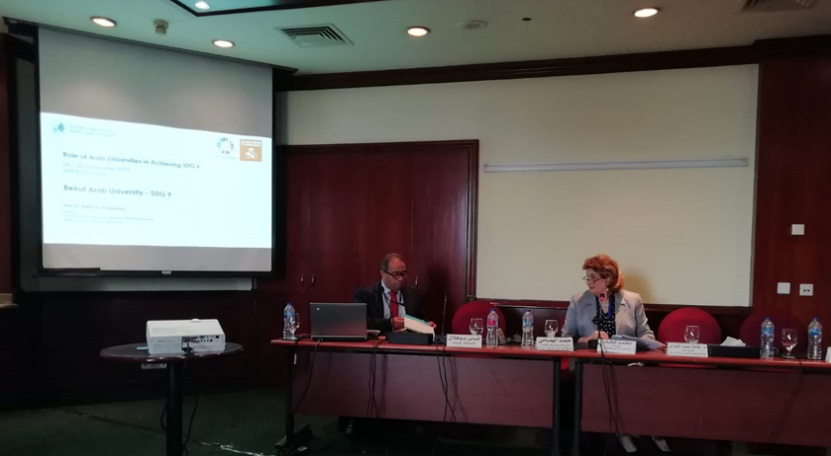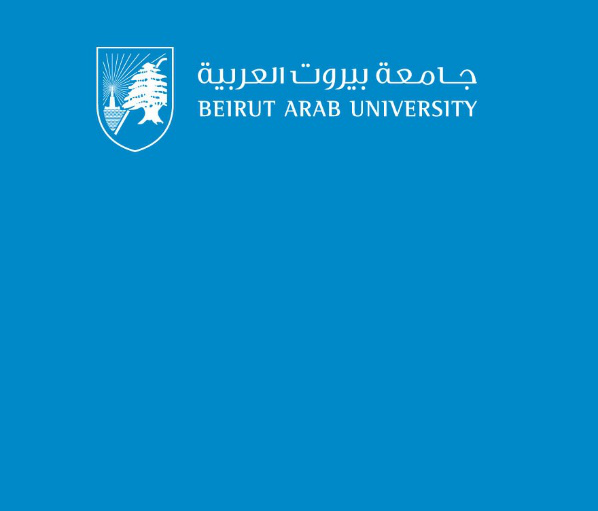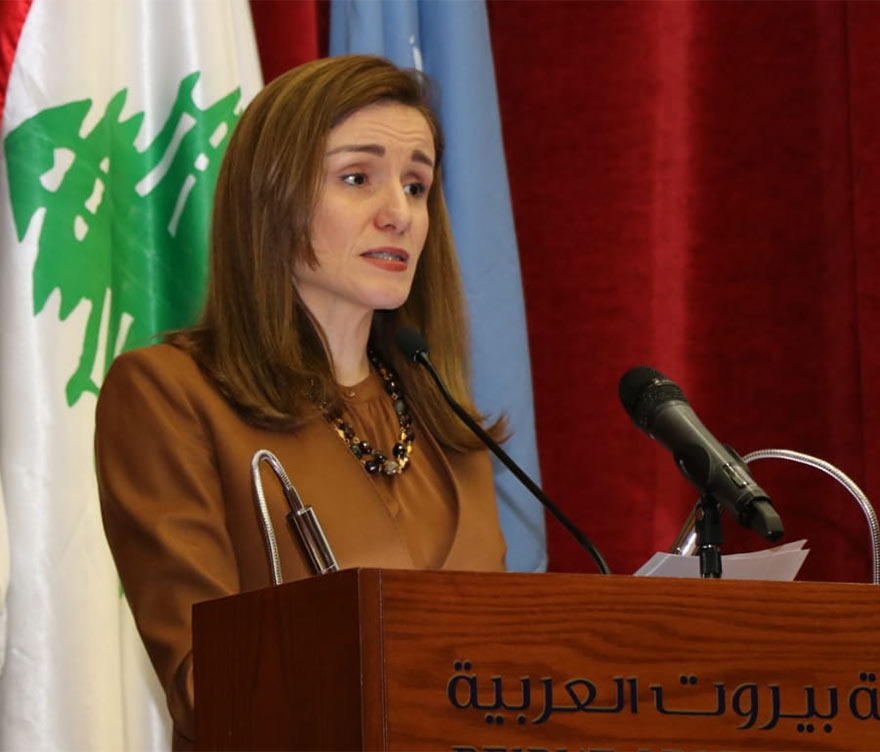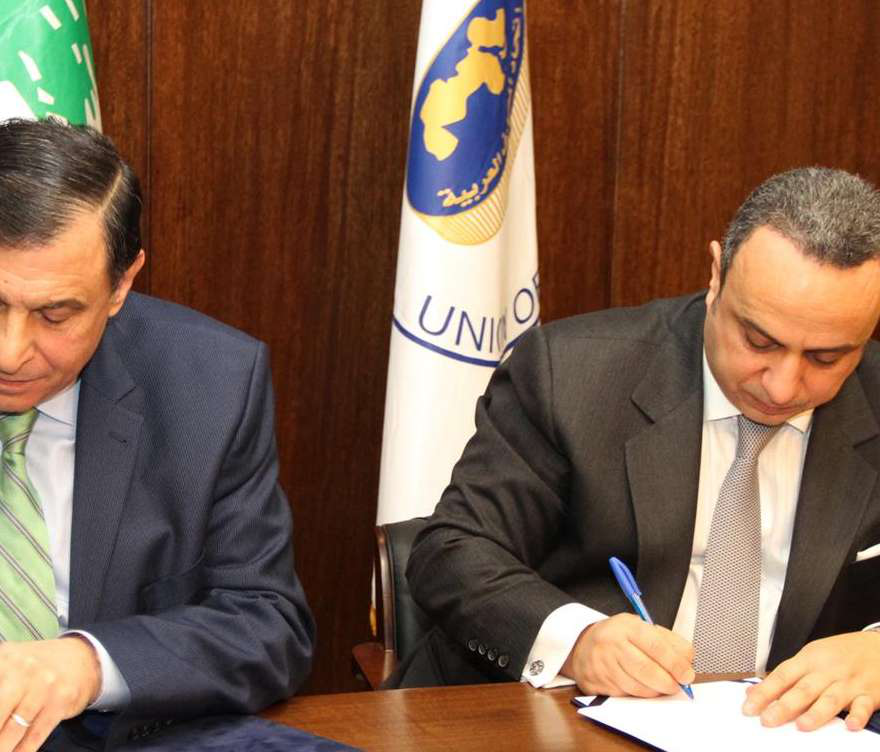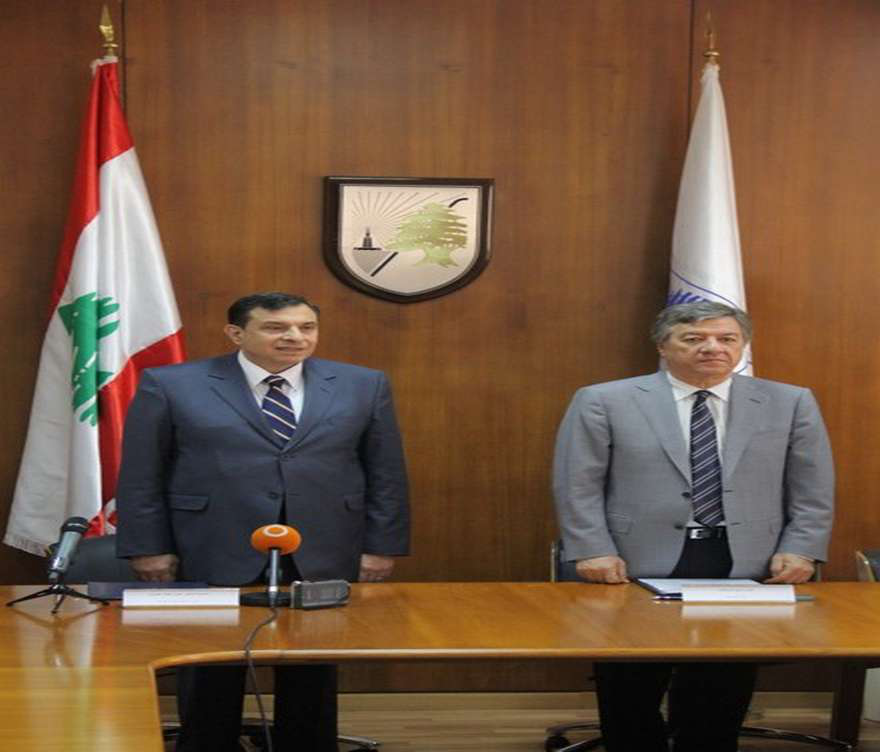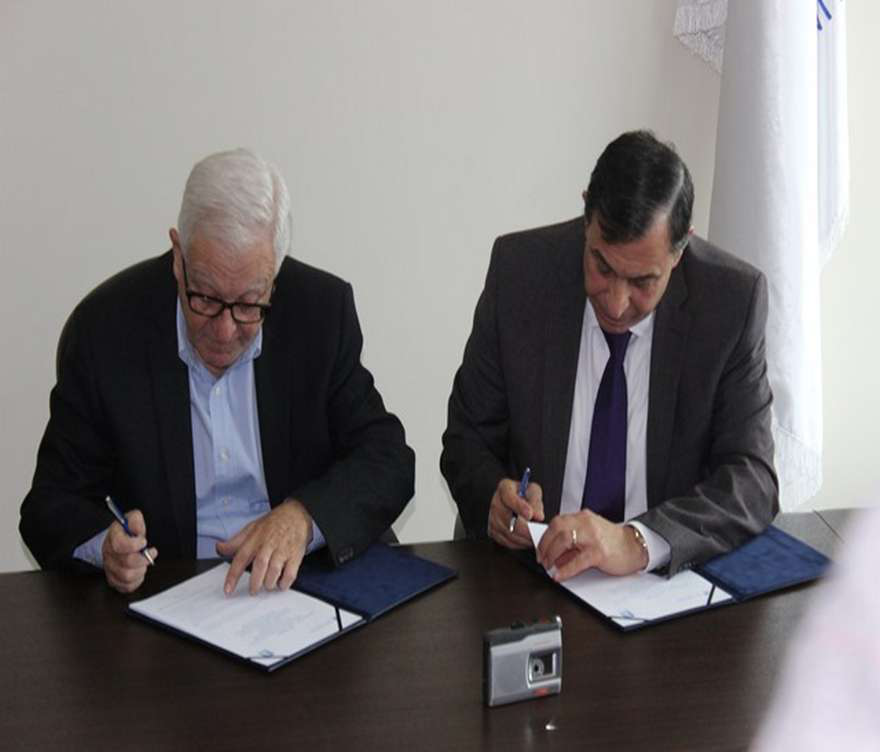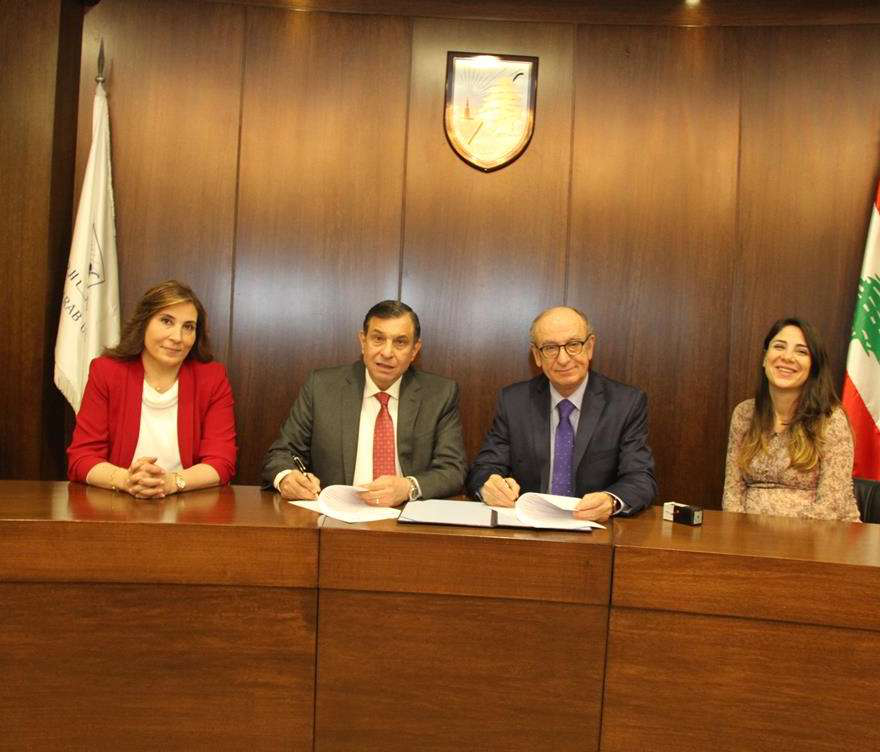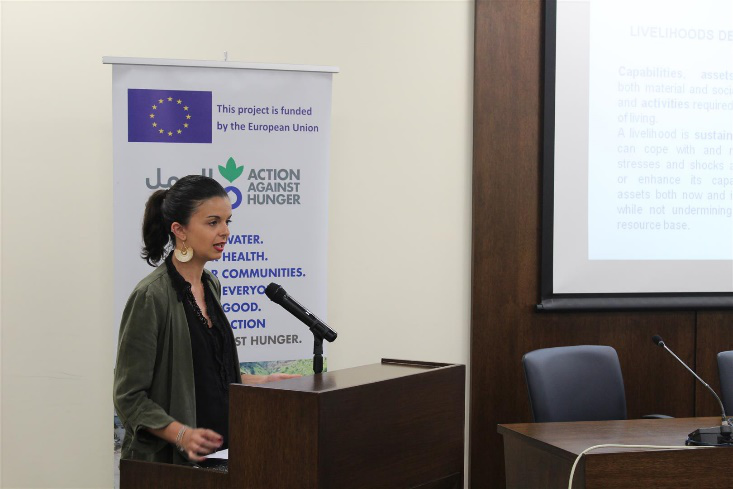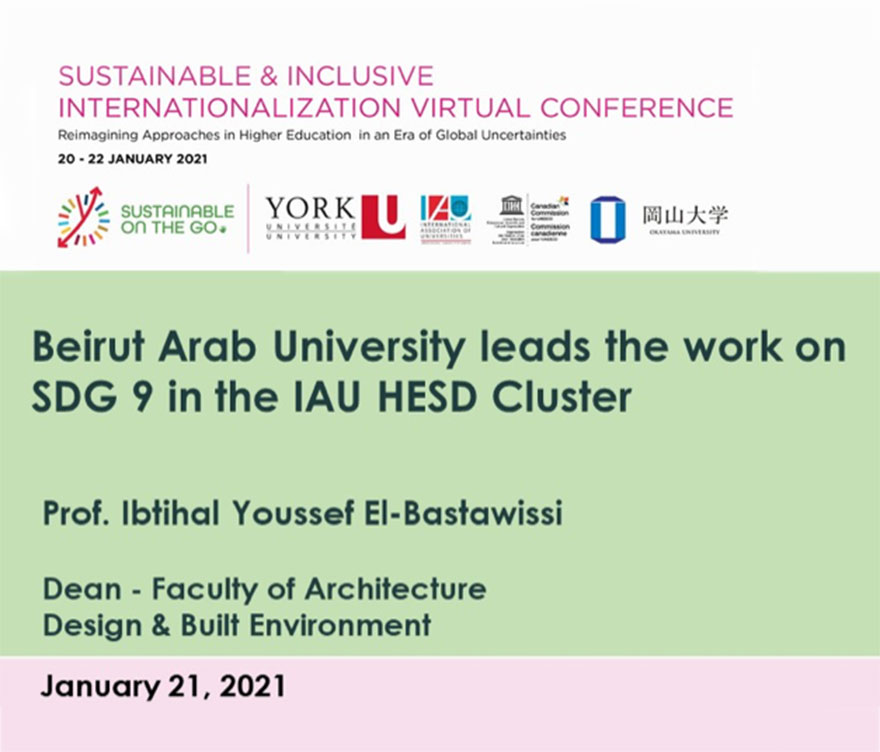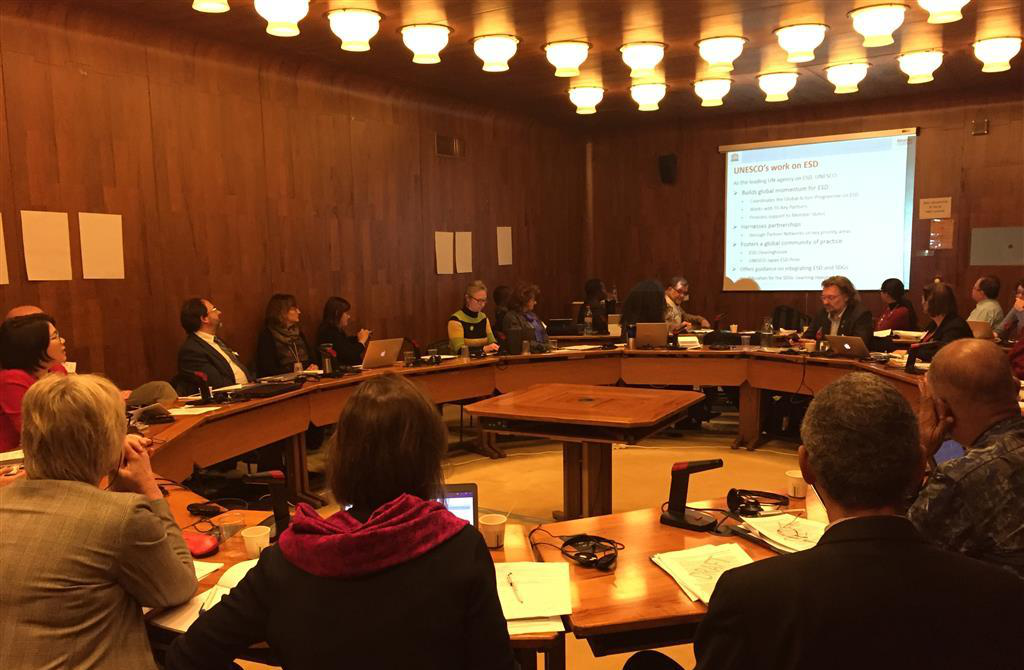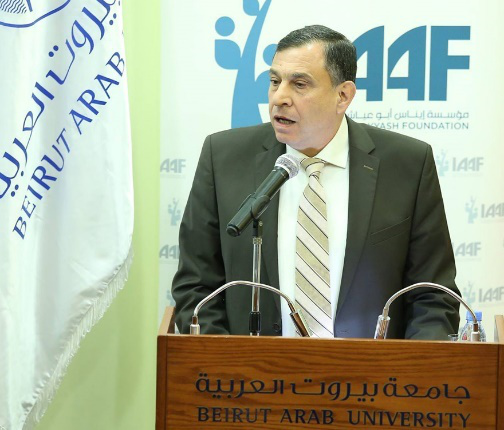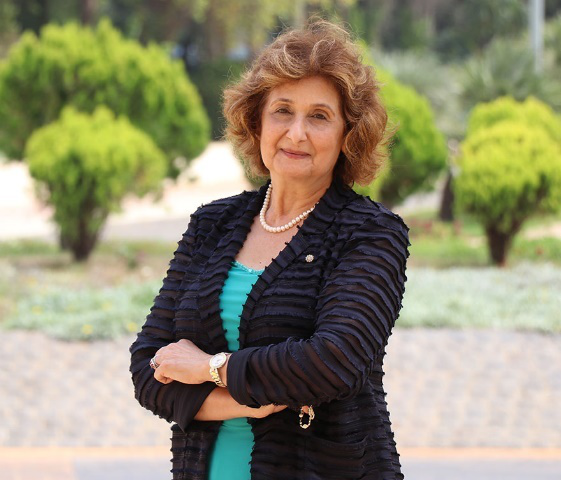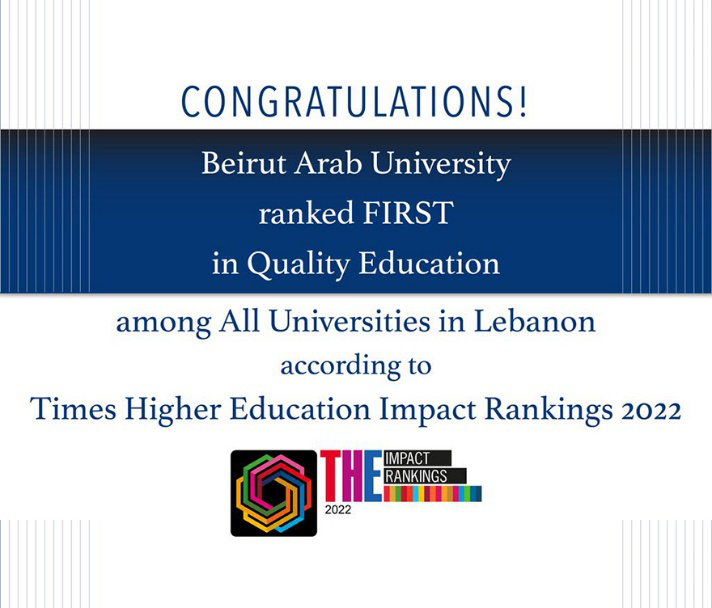Direct involvement in, or input into, national government SDG policy development
Prof. Dr. Ibtihal Youssef El-Bastawissi represented Beirut Arab University at “the regional meeting on the role of Arab universities in achieving the Sustainable Development Goals” workshop, which was held under the patronage of Minister of Higher Education and Scientific Research in the Arab Republic of Egypt, Dr. Khalid Abdul Ghaffar.
The workshop was attended by a large number of Arab universities from Egypt, Mauritania, Sudan, Oman, Yemen, Syria, Iraq, Lebanon, Jordan and Palestine, as well as representatives of UNESCO regional offices in Egypt and Beirut. Prof. Ibtihal El-Bastawissi presented the projects and activities carried out by Beirut Arab University in supporting the 17 sustainable development goals SDGs set by the United Nations focusing on Goal 9 since BAU was selected last year to represent and lead SDG 9 (industry, innovation and infrastructure) in the International Association of Universities (IAU) HESD (Higher Education and Research for Sustainable Development) Cluster.
Prof. El-Bastawissi also stressed within its presentation on how BAU community based projects, initiatives and research activities have been mapped to Goal 9 targets including supporting Sustainable and resilient infrastructure, promoting inclusive industrialization and enhancing scientific research.
The Dean ended up by highlighting on the new initiatives undertaken by Beirut Arab University to achieve the sustainable development goals as proposed in its strategy.
Beirut Arab University represented by its President Professor Amr Galal El Adawi has signed two agreements of cooperation with The Delegation of International Committee of the Red Cross in Lebanon (ICRC) and The United Nations Industrial Development Organization (UNIDO).
The agreement with The Delegation of International Committee of the Red Cross in Lebanon whose duration is one-year renewable states the university’s interest to train students of the Faculty of Health Sciences – specialized in nursing (Tripoli Branch) where ICRC shall provide all the facilities needed to assist the University in achieving its mission in nursing within the Weapon Traumatology Training Center it operates in Dar Al Chifae and Dar Al Zahraa Hospitals.
The ICRC shall provide training to students about the theoretical information they acquired at the University such as applying the basic nursing care such as measuring the pulse, pressure, temperature as well as drawing blood and inserting IV lines.
As such, the agreement of cooperation with The United Nations Industrial Development Organization in the context of the project “Market-Based Construction Skills Training for All” funded by the Government of Japan and implemented in partnership with the Ministry of Industry in the Lebanese Republic states to establish a vocational training center at BAU – Tripoli campus.
The duration of the project is renewable and ends by March 31st, 2020 inclusive. The agreement states doing vocational training in the fields of electricity and renewable energy where UNIDO develops awareness strategy to choose trainers and trainees for the Vocational Training Center; on the other hand, the University shall recruit trainers among its network of faculty and students and shall promote the center among its channels in the community.
Under the theme “A Defender for a Right”, the Office of the United Nations High Commissioner for Human Rights (OHCHR), in collaboration with the United Nations Information Centre in Beirut (UNIC Beirut) and Beirut Arab University (BAU), organized a special ceremony to commemorate the 70th anniversary of the Universal Declaration of Human Rights (UDHR) and celebrate Human Rights Day.
The ceremony, which was held at BAU Premises, was attended by Bassam Al-Halabi, representative of Minister of State for Human Rights Affairs Ayman Choucair, MP and Head of the Parliamentary Committee for Human Rights Michel Moussa, MP and representative of Prime Minister-designate Saad Hariri Roula Tabesh, Regional Representative of OHCHR Regional Office for the Middle East and North Africa (ROMENA) Roueida El-Hage, Director of the UN Information Centre in Beirut Margo El-Helou, President of the Lebanese Constitutional Council Issam Sleiman, President of Beirut Arab University Amr Galal El-Adawi and BAU Secretary General Omar Houri.
The ceremony was also attended by representatives of military and security leaders, BAU professors and students, representatives of media outlets and organizations specialized in human rights issues. El-Adawi in his statement said that “intolerance, xenophobia and incitement to racial and religious hatred all endanger the very essence of human rights.”
He also noted that “BAU is one of the first universities in the Arab region that introduced the human rights course as a compulsory requirement for all university students and this shows its unwavering commitment to human rights principles. It also established a Human Rights Center in 2009, whereby volunteers participate in awareness raising activities aiming at combating extremism through social media networks.”
El-Adawi concluded his statement by saying that BAU is committed to the achievement of the 2030 Agenda and its related 17 Sustainable Development Goals (SDGs) as member of the Global Compact Network in Lebanon. “BAU is constantly seeking to achieve social justice and sustainable development in the country,” he pledged.
An Agreement of Cooperation between Beirut Arab University the Union of Arab Banks and was signed by the President of Beirut Arab University Prof. Amr Galal El Adawi and the Secretary General of the Union of Arab Banks Mr. Wissam Fattouh at Issam Houri Hall at Beirut Arab University- Beirut Campus. The agreement stipulates the establishment of a Master’s Diploma specializing in Combatting Money Laundering and Funding Terrorism which is the first program of its kind to be taught in Arabic.
The signing ceremony was attended by Prof. Nehale Mustafa, the Dean of the Faculty of Business Administration at Beirut Arab University, as well as a number of Academic Staff at the University and a delegation from the Union of Arab Banks.
The ceremony opened with a speech delivered by Mr. Wissam Fattouh, Secretary General of the Union of Arab Banks. He highlighted the importance of the agreement, in terms of disseminating the culture of combating money laundering and funding terrorism. He maintained that the current aggravation of extremism and terrorism, endangering the remains of stability both socially and economically, necessitated a practical initiative aiming at providing the banking sector with professional graduates, specializing in combating money laundering and funding terrorism.
Realizing the importance of this initiative in the Arab Region, the Union of Arab Banks, in cooperation with Beirut Arab University, launches a Master’s Diploma specializing in combatting money laundering and funding terrorism. It is the first program of its kind to be taught in Arabic in accordance with international standards.
The program aims to provide graduates of the Faculty of Business Administration, Economics, Financial and Banking Sciences of its various branches and specializations, and graduate new recruits in the Arab banking sector, and employees whose responsibilities overlap with the contents of the program.
They will be provided with the necessary information in accordance with the regional and international legal and legislative requirements.
Mr. Freij Sabonjian, the Minister of Industry, and Professor Amr Galal El Adawi, President of Beirut Arab University, together with Mr. Nehmé Afram Head of the Association of the Lebanese Industrialists and Dr. Hasan Al Sharif, representing the National Council for Scientific Research, signed an Agreement of Cooperation between the Lebanese Industrial Research Achievements Program and BAU.
The agreement aims at procuring a framework within which both parties can carry out common activities such as:
Establish industrial and graduate research projects between BAU and the industry sector [5].
Conduct a feasibility study when necessary.
Exchange information and experience.
Provide the necessary funding for the common activities, conferences and seminars [5].
Seek other concerned parties especially the industrial institutions and international organizations.
Encourage factories to welcome students in their labs and to provide them with the necessary scientific experience and production technology.
Seek harmony between the engineering, science and technology programs and the industry and the job market needs.
Contribute in all of the activities which revenues will be used to equip the university labs with the necessary tools to conduct applied research.
The Head of Al Mina Municipality Mr. Abdulkader Alameddine and President of Beirut Arab University Professor Amr Galal El Adawi signed an agreement of mutual cooperation to support the scientific activities in AL Mina Municipality- Tripoli and to benefit from the logistic capacities, the data charts available at the municipality and the scientific experiences at BAU.
A meeting for this purpose was held in BAU- Tripoli Campus in the presence of the Head of the Municipality Council and members, BAU President Professor El Adawi, BAU Vice President for Tripoli Branch Affairs, Professor Khaled Baghdadi, BAU Secretary General Dr. Omar Houri, Deputy Secretary General for BAU- Tripoli Branch, Mr. Mohammad Hammoud, as well as Tripoli Branch Coordinator and Head of the Alumni in Tripoli Mr. Ahmad Sankari.
During the meeting, BAU president noted the “importance of cooperation with Al Mina Municipality” saying “we have become a part of it as the campus falls in its geographic realm, and thus we have to employ all of our potentials to help the municipality achieve a lot of projects. Being dear to our hearts, Al Mina requires our absolute support and contribution in its development at all levels especially that it has a unique corniche in Lebanon.”
The Human Rights Center (HRC) at Beirut Arab University organized its Seventh Exhibition of NGOs at Beirut campus under the title of "United Nations Sustainable Development Goals for the 2030 Agenda and Environment Preservation" in the presence of Minister of Environment Fadi Jreissati represented by Mrs. Anna Shaderfian.
HRC Specialist Ms. Salam Zahran opened the exhibition, stressing the fact that "this exhibition is an opportunity to introduce students to human rights issues with the participation of 47 associations and organizations concerned with all that aims to give the individuals their rights to contribute to the development of society at all levels." BAU Secretary General and HRC Director Dr. Omar Houri stated that “this exhibition in its seventh edition has become an annual tradition for our students to meet with civil society organizations, the unknown soldiers in our country, keep abreast of their progress, discuss social affairs and harness these efforts to serve sustainable development."
In his speech, BAU President and Chairman of the HRC Board of Directors Prof. Amr Galal El-Adawi indicated that, since its establishment in 2009, the Center has played a major role at the university, Lebanese and regional levels through its relationship with local and international organizations. BAU has also committed itself to achieving the 17 UN objectives both at the levels of research and education at the various faculties. BAU also seeks to achieve sustainable development through the application of the concept of community service which is a key component of its current strategy.
El-Adawi, also, thanked the participating associations and organizations for their participation in this exposition.
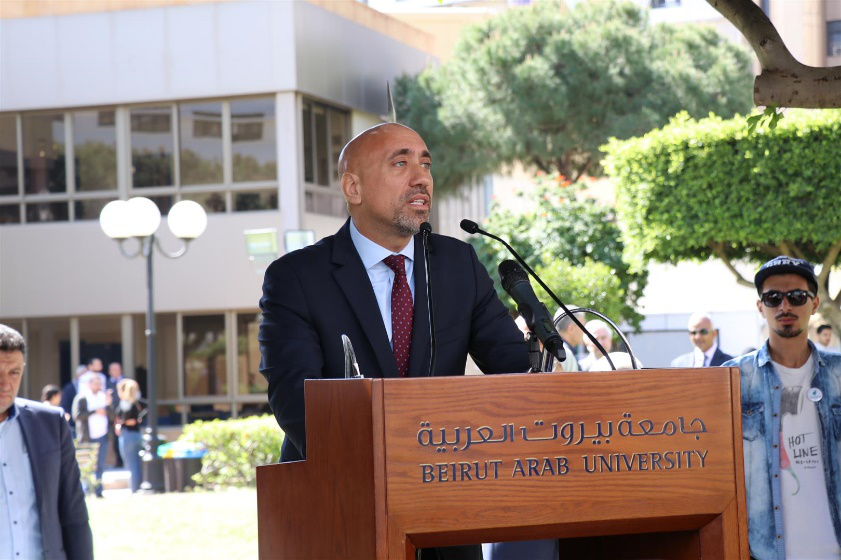
Beirut Arab University (BAU), represented by its president Prof. Amr Galal El-Adawi, signed a collaboration agreement with the National Council for Scientific Research (CNRS) represented by the Secretary General of the Council, Dr. Moeen Hamza in BAU’s Beirut campus in the presence of the Dean of Graduate Studies and Research, Prof. Hania Nakkash.
The collaboration aims at providing funding opportunities for BAU researchers where the University will provide financial support to the research projects equivalent to the amount provided by the Council, thus doubling the total amount of financial assistance allocated to accepted research projects.
This agreement is in the context of BAU’s effort to endorse research activity by allowing more funding options for BAU researchers and also allowing for the alignment of the CNRS research priorities with BAU research themes.
The Seminar aimed to introduce BAU students to the NGO’s field with an internationally accredited humanitarian charity, qualified as a “top-rated hunger organization”and to explore cooperation potential. The seminar targeted Science and Engineering students along with Faculty members and staff. It started with a welcoming note from Dr. Ghada Khawaja, Assistant Dean of the Faculty of Science, introducing AAH organization, highlighting its important support to displaced Syrians, and hosting Lebanese vulnerable communities in Bekaa and South of Lebanon.
Ms. Beatriz Navarro, the Country Director of AAH, gave a quick briefing on the establishment of AAH and its worldwide programs aiming at eradicating poverty and hunger and highlighted AAH Lebanon mission’s strategy. Afterwards, members of AAH team; Mrs. Justine Cherrier, the coordinator of Livelihood & food security projects, Mr. Edgar Barata, the coordinator of WASH projects, Mrs. Elise Jabagi, the deputy manager of WASH program, presented several talks explaining the nutrition and livelihood, WASH and solid waste management projects of AAH in the country.
Mrs. Khouloud Mahdi, the manager of WASH program, shared as well, her experience as a biochemist working in the sector. In the discussion panel, the attendees simplified how students with scientific background could join the NGO’s working in WASH program, particularly, in solid waste management and the possibility of an internship in this field and job opportunities.
Beirut Arab University, represented by Prof. Ibtihal Y. El-Bastawissi (Dean, Faculty of Architecture – Design & Built Environment) and Siam University, represented by Prof. Pornchai Mongkhonvanit (President of Siam University) have been invited by the IAU (International Association of Universities) to share their experience in engaging with the Cluster and sustainability in the Networking Session in the York Virtual Conference on Sustainable and Inclusive Internationalization.
The conference was organized by York University – Canada, in partnership with the IAU, Okayama University – Japan, and Canadian Commission for Unesco.
The conference took place on 20-22 January 2021, while the Networking Session that has been hosted by the IAU was on 21 January 2021. In her presentation, Prof. El-Bastawissi focused on achieving the SDG goals generally and SDG9 particularly through education, research, conferences, new labs, innovation and community-based projects as well as wide-spreading BAU Journals, and developing partnerships with other universities.
Following this successful intervention in the conference, IAU represented by Hilligje van't Land, the Secretary General, welcomed BAU and Siam Universities to share concrete examples of community engagement focusing on social impact to be presented by IAU during the University World News Webinar entitled “Building Social Impact and Civic Engagement on 27 January 2021.
Prof. El-Bastawissi shared with the IAU seven examples on BAU Community Engagement and on the university’s role in promoting sustainable urban development.
The International Association of Universities IAU has launched a Global Cluster on Higher Education and Research for Sustainable Development (HSED) to advocate for the Key Role that higher education institutions play in achieving agenda 2030. The global endeavour directly engages universities in addressing all 17 sustainable development goals SDGs.
Beirut Arab University was selected to represent and lead SDG 9 Industry, innovation and infrastructure that aims mainly to promote inclusive and sustainable industrialization, enhance scientific research, and support economic development and human well-being, with a focus on affordable and equitable access for all.
The Dean of the Faculty of Architecture, Design & Built Environment Professor Ibtihal El- Bastawissi is the BAU Institutional Coordinator at the IAU Global Higher Education Cluster. The IAU HESD Cluster consists of 16 lead universities, one for each SDG; IAU leads the work on SDG 17 on global partnerships. The lead universities, which are based in all world regions, will work with ‘satellite’ universities to advance a particular SDG, all the while ensuring synergies among all goals.
BAU has collaborated with IAAF to empower a team of students each year. While BAU offer them coaching and support, IAAF awards the winning team a $10,000 in cash to start their project.
The International Association of Universities IAU has launched a Global Cluster on Higher Education and Research for Sustainable Development (HSED) to advocate for the Key Role that higher education institutions play in achieving agenda 2030. The global endeavour directly engages universities in addressing all 17 sustainable development goals SDGs.
Beirut Arab University was selected to represent and lead SDG 9 Industry, innovation and infrastructure that aims mainly to promote inclusive and sustainable industrialization, enhance scientific research, and support economic development and human well-being, with a focus on affordable and equitable access for all.
The Dean of the Faculty of Architecture, Design & Built Environment Professor Ibtihal El- Bastawissi is the BAU Institutional Coordinator at the IAU Global Higher Education Cluster. The IAU HESD Cluster consists of 16 lead universities, one for each SDG; IAU leads the work on SDG 17 on global partnerships.
The lead universities, which are based in all world regions, will work with ‘satellite’ universities to advance a particular SDG, all the while ensuring synergies among all goals.
The fourth edition of the Times Higher Education (THE) Impact Ranking in 2022 was issued. This year’s assessment included 1406 Universities from 106 countries/ regions.
This is the first year Beirut Arab University participates in the THE Impact Ranking which assesses Universities against the United Nations’ Sustainable Development Goals (SDGs). BAU ranked third in Lebanon, a total of six Universities in Lebanon made it to the THE Impact Rankings list this year. BAU’s top scoring SDGs were SDG 4 “Quality Education”, SDG 3 “Good Health and Wellbeing”, SDG 5 “Gender Equality” and SDG 17 “Partnership for the Goals”, with BAU having the highest score in Lebanon on Quality Education with a score of 73.3 and ranking 100th worldwide.
BAU also held the second highest score in Lebanon on both SDG 3 & SDG 5. BAU embraces the United Nations’ Sustainable Development Goals (SDGs) within its strategy and had also aligned its research themes with these SDGs to guide BAU’s research production and enhance BAU’s visibility, collaboration, opportunities and partnerships.
BAU is hence proud to be a top scorer on quality education as it is our aim to provide inclusive quality education and empower our community with education, knowledge, and lifelong learning opportunities. This is just the beginning!.
